Attending in-person culinary classes isn’t always an option for everyone who wishes to learn. The school’s calendar may conflict with the prospective student’s work schedule. There may be small children at home who can’t be left alone. Or there may not even be a culinary school in town!
When this is the case, virtual cooking classes could be a smart option. Taught entirely online, these courses can impart individual skills, like how to make pizza or bake bread. Or in the case of Auguste Escoffier School of Culinary Arts, students can earn diplomas or associate’s degrees in culinary arts, plant-based culinary arts, or baking and pastry via an online program, including an industry externship!
Here’s what you should know about learning to cook online.
How Do Virtual Cooking Classes Work in Culinary School?
Without a chef standing in the room to taste your dishes, how do virtual cooking classes work? That was the question the Escoffier team of educators had to answer when creating the only U.S. accredited institution offering 100% online diplomas and degrees nationwide with culinary classes and hands-on industry externships.**
The resulting curriculum includes readings, video content, live classes, online discussions, cooking assignments, and personalized feedback from industry-leading Chef Instructors, making Escoffier’s programs comprehensive and specially designed for online learners.
When online professional cooking classes are taught at an accredited institution, students can receive a competitive education that can prepare them for the rigors of the culinary industry. And with a degree or diploma on their resume, these students can help show future employers that they’re committed to their craft.
Here’s how it works:
1. Live Classes with Chef Instructors
Students begin their week attending a live virtual class led by their Chef Instructor. This is akin to the “lecture” portion of an on-campus culinary class. The instructor may explain the material or provide demonstrations of certain techniques. Students may also have the chance to ask questions for greater clarity in a second live session or via email or a 1:1 appointment.
2. Reading, Videos, and Discussion for Deeper Study
After the sessions, students move forward with a reading assignment and video content to further introduce them to the material the instructor has shared. Throughout the week, they can also participate in online discussion boards where they can ask questions and connect with their fellow students.
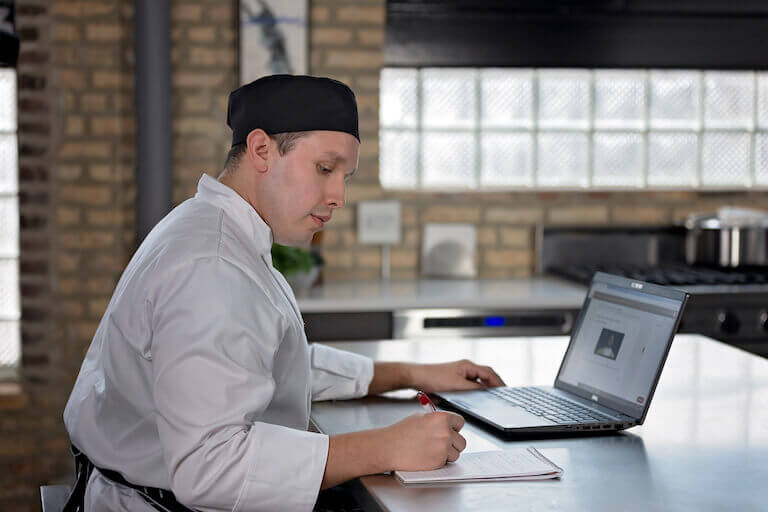
3. Cooking Assignments to Turn Theory Into Reality
Next, it’s time to practice.
One of the benefits of online learning is that students can complete their assignments on their own schedules, as long as they meet the program’s milestones and deadlines. So if it’s best for a student to complete the cooking portion of their course late at night, during the day when their kids are at school, or on a day off from their job, they’re welcome to do that!
As they work through their assignments, students document their progress through a series of photos of their cooking process, plus a critical thinking narrative to help them relate cooking theory to their own hands-on work. They can also add notes on the completed dish, using the Escoffier flavor wheel to assess what they’re tasting. When they’re done, they can submit the photos and summary through Escoffier’s learning management system.
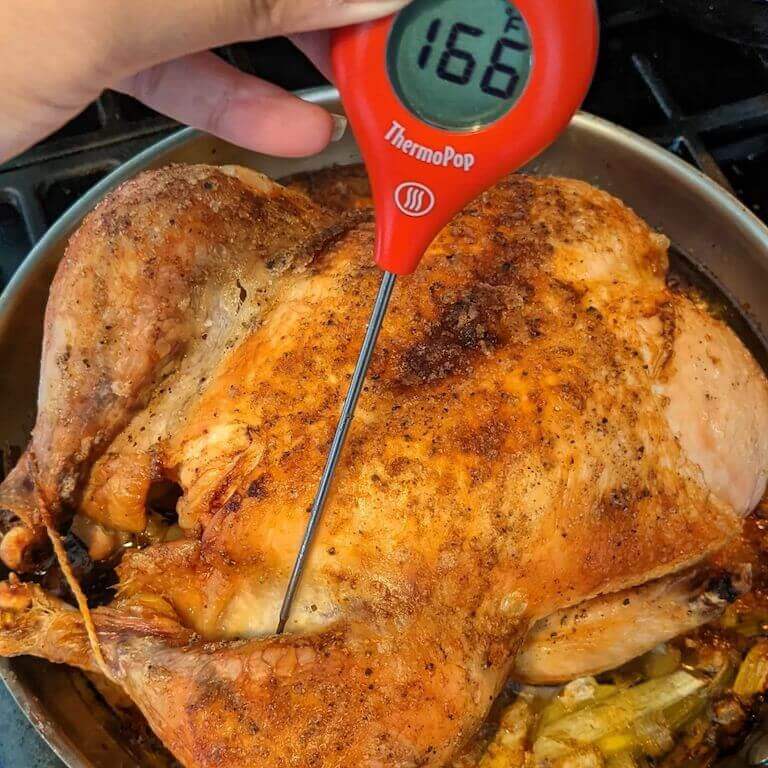
An online Escoffier student documents a chicken’s temperature during their assignment.
4. Video Feedback with Guidance from Chef Instructors
The Chef Instructor can then review each student’s photos and summary, reconstructing their cooking process and assessing it against industry standards and expectations, which become the basis for a personalized video feedback session. This can allow the student to hear where the exceled, and get suggestions for improvement that can help them grow as a culinarian.
Professional chefs assess food primarily through sight, looking for things like grill marks, color development, sauce consistency, rise in dough and formation of breads. The instructor can determine what the student has done correctly (or not) based on looking at the results. The instructors also employ a common language through the use of the Flavor Wheel–a series of 90+ common descriptors that help assess flavor–but taste is always somewhat subjective, even in professional kitchens.
“If I can’t taste it, you have to verbally be able to tell me: Was it salty? Was it bland? Was it tangy? I think students being able to verbally describe foods and tastes has proven to be a tremendous asset.”*
Jesper Jonsson, Escoffier Chef Instructor and Board Member, American Culinary Federation
What Tools Do Students Need for Their Online Cooking Classes?
In enthusiast virtual cooking classes and any self-led education, the student is responsible for securing all of their own tools.
But with Escoffier’s online cooking classes for the degree and diploma programs, students receive a toolkit that includes many of the items they may need as they begin their coursework. (Please note that these toolkit contents are subject to change and the items listed may not reflect the current Escoffier toolkit.)
Students in the culinary arts, pastry arts, and plant-based culinary arts programs can receive*** a toolkit that may include:
- A chef’s coat, apron, and skullcap to wear during classes
- A kitchen scale
- Chlorine test strips
- A 3.5” paring knife
- A digital probe thermometer
- A pastry bag
- An 8” chef’s knife
- A plastic bowl scraper
- A double zip case
Culinary Arts Supplemental Tools
In addition to the above tools, students studying culinary arts and plant-based culinary arts with Escoffier may receive additional tools, including:
- A Y-Peeler
- A Mercer Rules ruler
- A 6” boning knife
- A 10” German steel knife
- A high-temp stirring spoon
- A cutlery tube set
Depending on the program, some students may get additional items, like a wire whisk, pastry brush, and microplane.
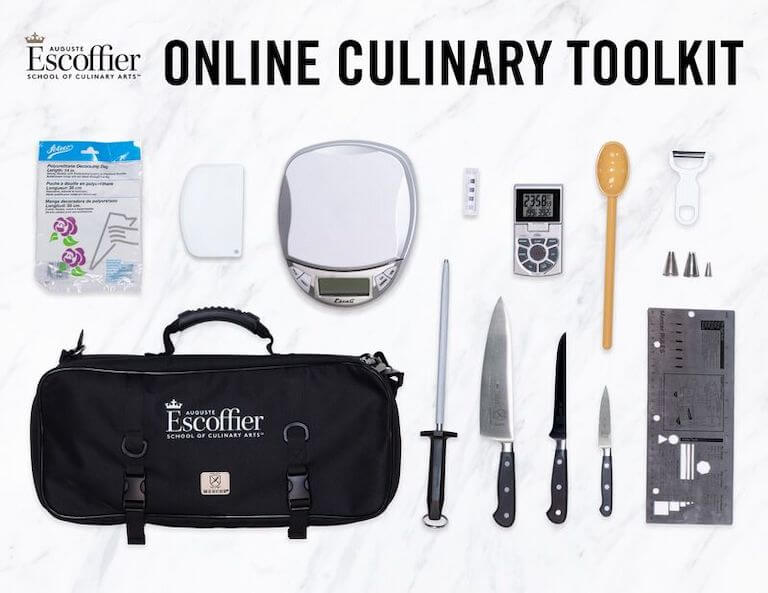
Baking & Pastry Arts Supplemental Tools and Starter Ingredients
Baking and pastry arts students taking online classes need a different set of tools since their work has unique requirements. So in addition to the core tools mentioned above, these students may receive these supplemental items:
- A bench scraper
- A fine zester
- Decorating tips
- A 12” wavy edge slicer
- Spatulas
- A piano wire whip
- A heat-resistant scraper
- A pastry brush
- A pastry tube set
- A flower nail tip
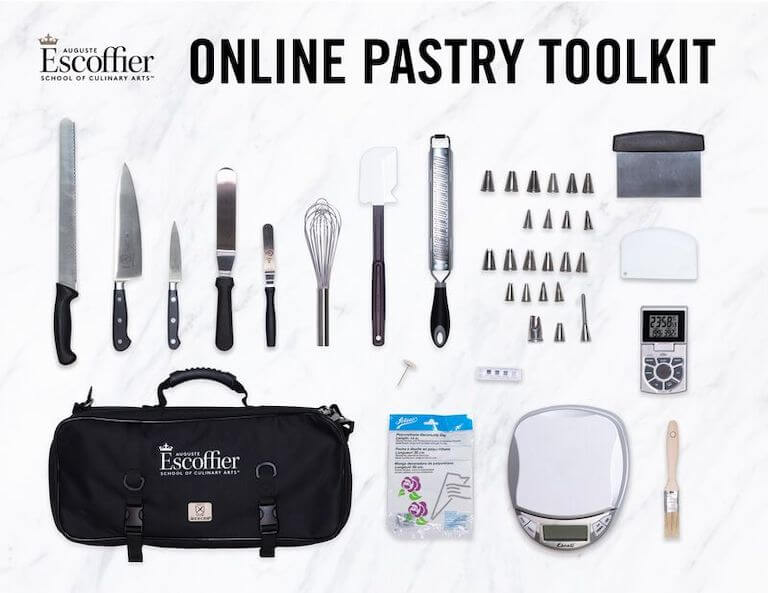
With these tools, students can be well-equipped to begin their professional cooking classes! Note that there may be additional ingredients needed for all programs, which must be provided by the students. Students may also need additional tools including cookware, bakeware, a stand mixer, sheet pans, cutting boards, etc. Fortunately, most of these items can be easily found at a kitchenware store or in your kitchen already, and our faculty can be available to help students determine substitutions if they are missing a specific piece of equipment.
Other Types of Virtual Cooking Classes
For those who aren’t interested in a degree or diploma, there are other types of online cooking classes available. For students who want to learn a few specific techniques or who don’t have the resources to invest in an education yet, these classes may help bridge the gap.
Enthusiast Cooking Classes
Some students want to learn a specific skill or technique, but they also want the personal feedback of a Chef Instructor. For these students, virtual enthusiast cooking classes could be the answer.
These online courses are wonderful for the home chef who wants to learn basic skills or even a pro who wants to learn an advanced technique. Classes usually teach something specific, like how to make pizza or the secrets of quick breads. This makes them a valuable tool that can allow you to fill in gaps in your knowledge and become a more well-rounded cook.
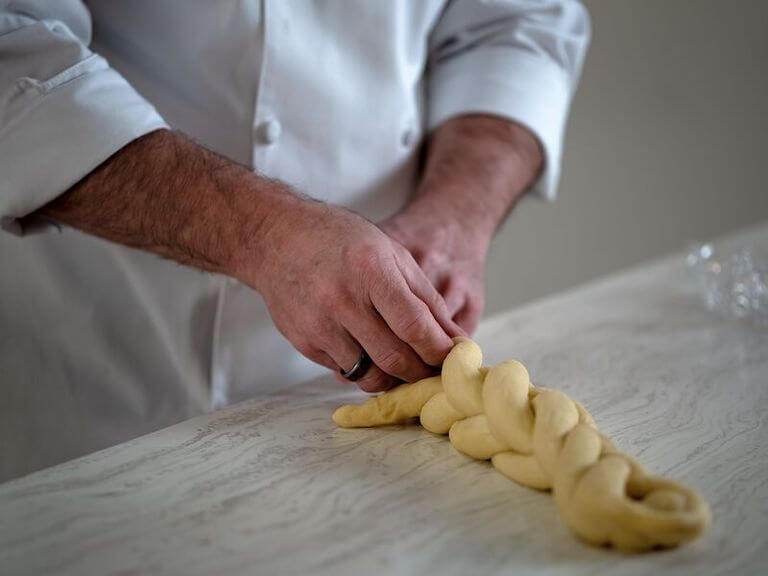
Massive Open Online Courses (MOOCs)
MOOCs are free or very low-cost resources that open education to anyone with an internet connection. These courses can be a valuable introduction to some culinary topics, but they do have their limitations.
To start, these are entirely pre-recorded courses and they may have thousands or even tens of thousands of students at any one time. Naturally, the instructors of these courses are not available to answer questions or provide feedback to this volume of students. So the flow of information is one way—from instructor to student, without the student having the opportunity to get clarification or corrections.
Also, these courses do not come with any kind of diploma or degree. They may include a certificate upon completion, but these certificates may not be helpful in proving that a student has the requisite skills for employment.
Further, the completion rate for MOOCs tends to be low. Even at reputable schools like Harvard, Stanford, and MIT, the completion rate of MOOCs hovers around 20%. It’s a complexity of human psychology, but we tend to value things in proportion to our investment in them. With a no-cost program, it’s very common for students to prioritize other things in their lives and not complete these courses.
Skill Up With Online Cooking Classes!
Just 20 years ago, virtual cooking classes were practically unheard of. Today, they are a popular and effective way for more students than ever before to get the education they’ve been dreaming of. Want to attend school while working full-time or taking care of your family? Online culinary school may be the answer.
Explore our online cooking classes in culinary arts, baking and pastry arts, and more to find out which one may be right for you. And when you have questions, our Admissions Department is available to give you the answers!
To learn more about online culinary classes, try these articles next:
- A Day in the Life of an Online Culinary Student
- Is Online Baking School Right For You?
- The Advantages of Online Learning: Why Online Education is Here to Stay
*Information may not reflect every student’s experience. Results and outcomes may be based on several factors, such as geographical region or previous experience.
**Our Boulder, CO campus is the only accredited institution in the United States to offer both fully online diploma and degree programs nationwide with culinary classes and hands-on industry externships. We are accredited by ACCET – A Partnership for Quality. ACCET is listed by the U.S. Department of Education as a nationally recognized accrediting agency.
***Toolkits may be unable to be shipped to certain international students depending on their location. Instead, they can receive a gift card to purchase items listed.

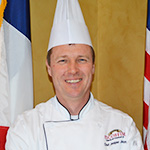 “If I can’t taste it, you have to verbally be able to tell me: Was it salty? Was it bland? Was it tangy? I think students being able to verbally describe foods and tastes has proven to be a tremendous asset.”*
“If I can’t taste it, you have to verbally be able to tell me: Was it salty? Was it bland? Was it tangy? I think students being able to verbally describe foods and tastes has proven to be a tremendous asset.”*